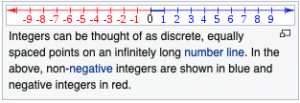klutedavid
Well-Known Member
- Dec 7, 2013
- 9,346
- 4,337
- Gender
- Male
- Faith
- Non-Denom
- Marital Status
- Single
I do understand. How about a set of monkeys that ignore definitions.[/Quote]A finite set is simply a set with a finite number of elements.The elements don't even have to be numbers they can be objects such pelicans, apples or aardvarks.In case of real numbers it doesn't matter that each number is finite, it's a case of counting each number in the set which is impossible given there are an infinite number of real numbers for any given interval or subset.[/QUOTE]Please explain what an 'infinite number' is?Apart from not answering my question it's painfully obvious you don't even understand what a finite set is.
Are you referring to transfinite numbers?
If you count the elements in any set, the count is always an integer value.
If you had a set of real numbers and no matter how large that set, there is always an integer count for each element in that set. So if one was to consider an infinite set of real numbers, then the elements of that set. Would require an infinite integer count. That is impossible of course because integers are finite numbers.
An infinite set of anything is a paradox.
Upvote
0


